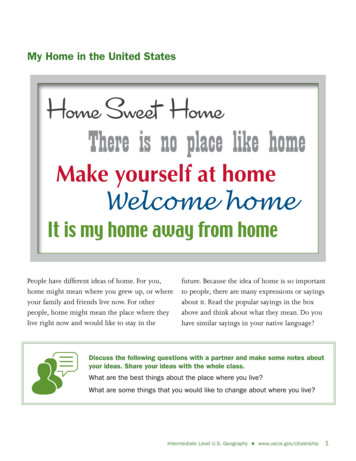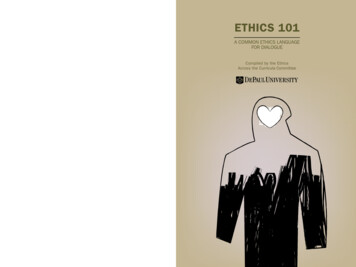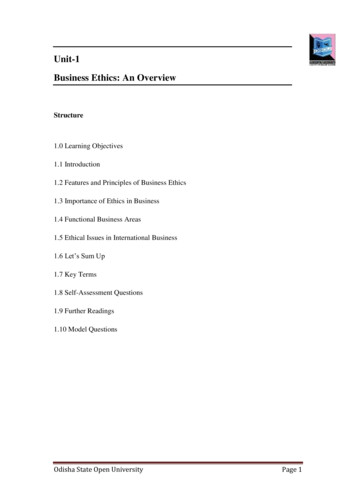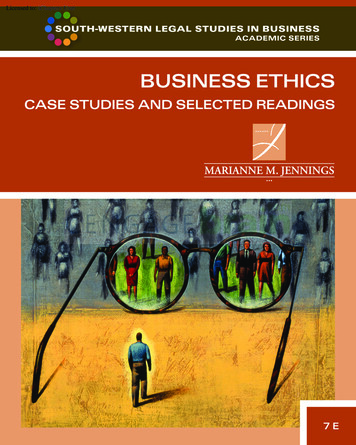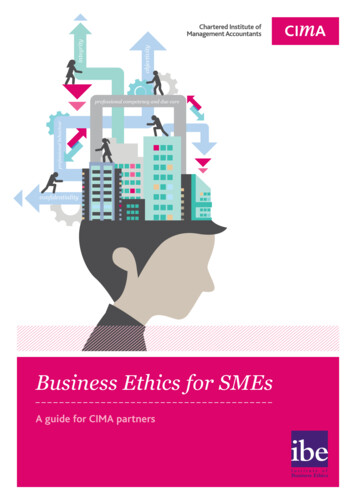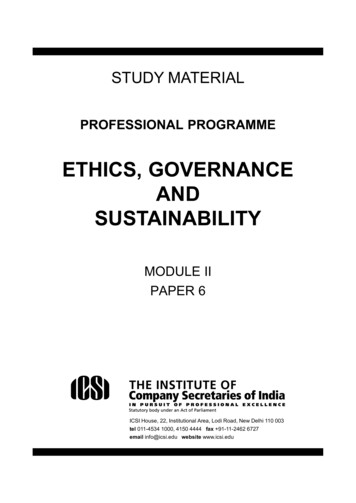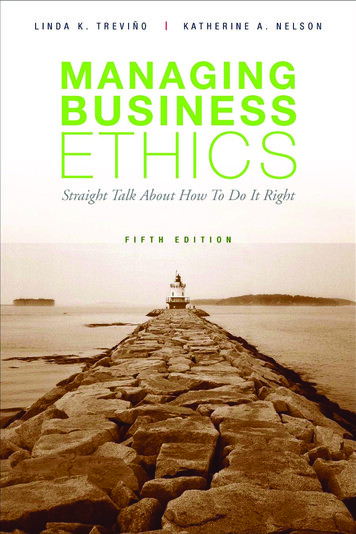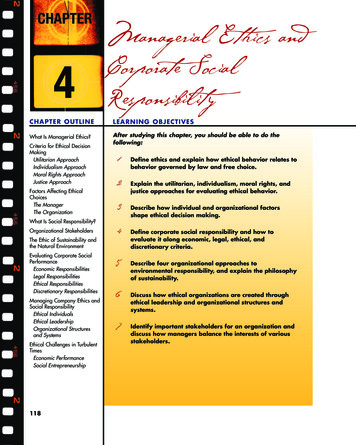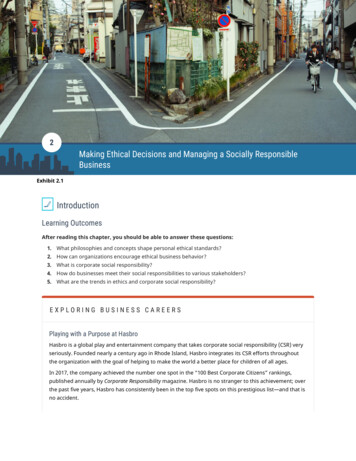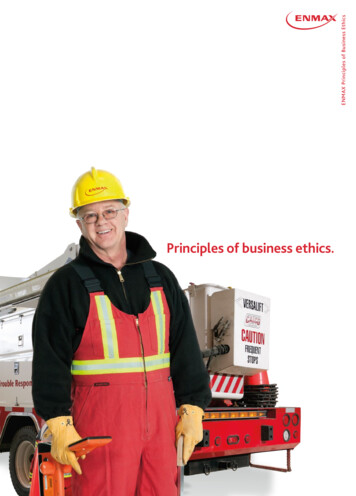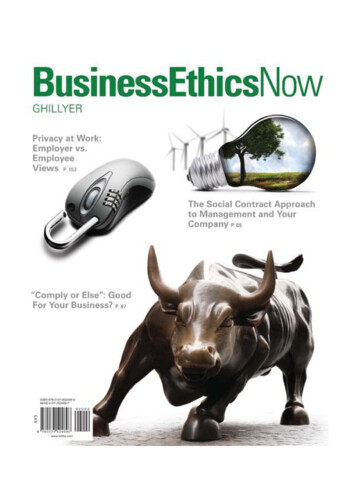
Transcription
BusinessEthicsNowCh. 1BRIEF TABLE OF CONTENTSDEFINING BUSINESSETHICSCh. 3THE PRACTICE OFBUSINESS ETHICSDefining BusinessEthics6 The Role of1 Understanding Ethics2 Defining Business7 Blowing the Whistle8 Ethics andPART 1EthicsCh. 4CORPORATE SOCIALRESPONSIBILITYGovernmentTechnologyPART 2The Practice ofBusiness EthicsThe Future ofBusiness Ethics3 Organizational Ethics4 Corporate Social9 Ethics andResponsibility5 CorporateGovernancePART 3Globalization10 Making It Stick:Doing What’s Right ina Competitive MarketCh. 9THE FUTURE OFBUSINESS ETHICSiv Business Ethics Nowghi24697 fm i-xii.indd iv2/8/11 9:43 PM
PART 1Review Exercises 15Defining Business EthicsInternet Exercises 15Team Exercises 161 Thinking Critically 1.1: ALL THE NEWS THAT’S FIT TOPRINT 17Understanding EthicsFRONTLINE FOCUS Doing the Right Thing 3Thinking Critically 1.2: THE MAN WHO SHOCKED THEWORLD 18WHAT IS ETHICS? 4Thinking Critically 1.3: LIFE AND DEATH 19UNDERSTANDING RIGHT AND WRONG 4How Should I Live? 4The Value of a Value 4Value Conflicts 5Doing the Right Thing 5The Golden Rule 6Table of ContentsETHICAL THEORIES 6Virtue Ethics 6Ethics for the Greater Good 62 Defining Business EthicsFRONTLINE FOCUS The Customer Is Always Right 21DEFINING BUSINESS ETHICS 22WHO ARE THE STAKEHOLDERS? 22AN ETHICAL CRISIS: IS BUSINESS ETHICS ANOXYMORON? 23ETHICAL DILEMMA The Ford Pinto 25Universal Ethics 6LIFE SKILLS What do you stand for, or what will you standagainst? 7ETHICAL RELATIVISM 7ETHICAL DILEMMAS 8ETHICAL DILEMMA Peer Pressure 8THE HISTORY OF BUSINESS ETHICS 26RESOLVING ETHICAL DILEMMAS 26Resolution 28LIFE SKILLS Making tough choices 29JUSTIFYING UNETHICAL BEHAVIOR 30Resolving Ethical Dilemmas 9ETHICAL DILEMMA Too Big to Fail? 30Ethical Reasoning 10REAL WORLD APPLICATIONS Everybody’s Doing It 31ETHICAL DILEMMA The Overcrowded Lifeboat 11CONCLUSION 31REAL WORLD APPLICATIONS Living with a ToughFRONTLINE FOCUS The Customer Is Always Right—Decision 12Nancy Makes a Decision 32CONCLUSION 13For Review 32FRONTLINE FOCUS Doing the Right Thing—MeganKey Terms 33Makes a Decision 13Review Questions 33For Review 14Review Exercises 33Key Terms 14Internet Exercises 34Review Questions 15ghi24697 fm i-xii.indd v2/8/11 9:43 PM
Review Exercises 57Internet Exercises 58Team Exercises 59Thinking Critically 3.1: BOOSTING YOUR RÉSUMÉ 60Thinking Critically 3.2: BANK OF AMERICA’S MOST TOXICASSET 61Thinking Critically 3.3: JOHNSON & JOHNSON AND THETYLENOL POISONINGS 624 Corporate SocialResponsibilityFRONTLINE FOCUS A Stocking Error 65CORPORATE SOCIAL RESPONSIBILITY 66Team Exercises 34Thinking Critically 2.1: PHOENIX OR VULTURE? 36Thinking Critically 2.2: AN UNEQUIVOCAL DEDICATIONTO BUSINESS ETHICS? 37Thinking Critically 2.3: TEACHING OR SELLING? 39The Practice ofBusiness EthicsPART 2MANAGEMENT WITHOUT CONSCIENCE 67MANAGEMENT BY INCLUSION 68REAL WORLD APPLICATIONS Unless They Ask 69THE DRIVING FORCES BEHIND CORPORATE SOCIALRESPONSIBILITY 69ETHICAL DILEMMA Global Oil 70THE TRIPLE BOTTOM LINE 71ETHICAL DILEMMA Banning the Real Thing 72Jumping on the CSR Bandwagon 743 Organizational EthicsFRONTLINE FOCUS Just Sign the Forms 43LIFE SKILLS Being socially responsible 76BUYING YOUR WAY TO CSR 76CONCLUSION 77DEFINING ORGANIZATIONAL ETHICS 44ETHICAL CHALLENGES BY ORGANIZATIONALFUNCTION 45FRONTLINE FOCUS A Stocking Error—Jennifer Makesa Decision 78For Review 78The Ethics of Research and Development 45Key Terms 79ETHICAL DILEMMA A Firm Production Date 45Review Questions 80Ethics in Manufacturing 46Review Exercises 80Ethics in Marketing 46Internet Exercises 80REAL WORLD APPLICATIONS “Talking At” or “TalkingTeam Exercises 81To”? 48ETHICS IN HUMAN RESOURCES 49ETHICS IN FINANCE 50All in a Day’s Work: Internal Auditors’ Roles 51Thinking Critically 4.1: WALMART 82Thinking Critically 4.2: CORPORATE SOCIALIRRESPONSIBILITY 83Thinking Critically 4.3: THE PESTICIDE DDT 85ETHICAL DILEMMA A Different Perspective 51ETHICAL CHALLENGES 52GAAP 52Creative Bookkeeping Techniques 52LIFE SKILLS Being ethically responsible 53CONFLICTS OF INTEREST 54CONCLUSION 55FRONTLINE FOCUS Just Sign theForms—Matt Makes a Decision 56For Review 56Key Terms 57Review Questions 57vi5 Corporate GovernanceFRONTLINE FOCUS “Incriminating Evidence” 87CORPORATE GOVERNANCE 88WHAT DOES CORPORATE GOVERNANCE LOOK LIKE? 88IN PURSUIT OF CORPORATE GOVERNANCE 90TWO GOVERNANCE METHODOLOGIES: “COMPLYOR EXPLAIN” OR “COMPLY OR ELSE”? 91“In the Know” or “In the Dark”? 91The Chairman and the CEO 91ETHICAL DILEMMA 20/20 Hindsight 92 Business Ethics Nowghi24697 fm i-xii.indd vi1/31/11 9:50 PM
EFFECTIVE CORPORATE GOVERNANCE 93REAL WORLD APPLICATIONS One and the Same 94FCPA in Action 11122 Questions for Diagnosing Your Board 94REAL WORLD APPLICATIONS AdditionalETHICAL DILEMMA A Spectacular Downfall 95Compensation 111The Dangers of a Corporate Governance Checklist 96Making Sense of FCPA 111LIFE SKILLS Governing your career 97A Fiduciary Responsibility 97THE U.S. FEDERAL SENTENCING GUIDELINES FORORGANIZATIONS (1991) 112CONCLUSION 98Monetary Fines under the FGSO 113FRONTLINE FOCUS “Incriminating Evidence”—AdamOrganizational Probation 113Makes a Decision 98Compliance Program 113For Review 99ETHICAL DILEMMA The Bribery Gap 114Key Terms 100Revised Federal Sentencing Guidelines forOrganizations (2004) 115Review Questions 100Review Exercises 100Internet Exercises 100THE SARBANES-OXLEY ACT (2002) 115Team Exercises 101Title I: Public Company Accounting OversightBoard 116Thinking Critically 5.1: HEWLETT-PACKARD: PRETEXTING 102Title II: Auditor Independence 116Thinking Critically 5.2: SocGen 103Titles III through XI 116Thinking Critically 5.3: HealthSouth 1056A Bark Worse Than Its Bite 110WALL STREET REFORM 117ETHICAL DILEMMA An Unethical Way to Fix Corporate The Role of GovernmentFRONTLINE FOCUS Too Much Trouble 109Ethics? 118The Dodd-Frank Wall Street Reform and ConsumerProtection Act 119KEY LEGISLATION 110LIFE SKILLS Governing your own ethical behavior 120THE FOREIGN CORRUPT PRACTICES ACT 110CONCLUSION 121Table of Contents ghi24697 fm i-xii.indd viivii1/31/11 9:51 PM
FRONTLINE FOCUS Too Much Trouble—Lara Makes aDecision 122For Review 122Key Terms 123Review Questions 123Review Exercises 124Internet Exercises 124Team Exercises 125Thinking Critically 6.1: PONZI SCHEMES 126Thinking Critically 6.2: INDIA’S ENRON 128Thinking Critically 6.3: MARTHA STEWART AND IMCLONESYSTEMS 1307 Blowing the WhistleFRONTLINE FOCUS Good Money 133WHAT IS WHISTLE-BLOWING? 134THE ETHICS OF WHISTLE-BLOWING 134Review Questions 144When Is Whistle-Blowing Ethical? 134Review Exercises 144When Is Whistle-Blowing Unethical? 135Internet Exercises 144The Year of the Whistle-Blower 136Team Exercises 144THE DUTY TO RESPOND 136Thinking Critically 7.1: QUESTIONABLE MOTIVES 146ETHICAL DILEMMA The Insider 137Thinking Critically 7.2: WIKILEAKS: PRINCIPLEDLEAKING? 147ETHICAL DILEMMA The Cold, Hard Reality 138Thinking Critically 7.3: THE OLIVIERI CASE 149ADDRESSING THE NEEDS OF WHISTLE-BLOWERS 140REAL WORLD APPLICATIONS A Hotline Call 141WHISTLE-BLOWING AS A LAST RESORT 141LIFE SKILLS Making difficult decisions 142FRONTLINE FOCUS Good Money—Ben Makes aDecision 142For Review 143Key Terms 1438 Ethics and TechnologyFRONTLINE FOCUS Problems at ComputerWorld 153INTRODUCTION: ETHICS AND TECHNOLOGY 154DO YOU KNOW WHERE YOUR PERSONALINFORMATION IS? 154THE PROMISE OF INCREASED WORKERPRODUCTIVITY 155The Employer Position 155The Employee Position 155ETHICAL DILEMMA A Failure to Disclose 156WHEN ARE YOU “AT WORK”? 156Thin Consent 157Thick Consent 157THE DANGERS OF LEAVING A PAPER TRAIL 159LIFE SKILLS The mixed blessing of technology 160Vicarious Liability 160ETHICAL DILEMMA Top 20 Blonde Jokes 161REAL WORLD APPLICATIONS Telecommuting 24/7 161The Right to Privacy—Big Brother Is in the House 162CONCLUSION 163viii Business Ethics Nowghi24697 fm i-xii.indd viii1/31/11 9:51 PM
FRONTLINE FOCUS Problems at ComputerWorld—SteveMakes a Decision 164For Review 165Key Terms 165Review Questions 166Review Exercise 166Internet Exercises 166Team Exercises 167Thinking Critically 8.1: STUMBLING OVER GMAIL 168Thinking Critically 8.2: REVERB COMMUNICATIONS 169Thinking Critically 8.3: THE HIPAA PRIVACY RULE 171ETHICAL DILEMMA For Services Rendered 178THE PURSUIT OF GLOBAL ETHICS 178ETHICAL DILEMMA What Is a Global Business? 180ENFORCING GLOBAL ETHICS 181The UN Global Compact 181REAL WORLD APPLICATIONS Globally Ethical 182THE OECD GUIDELINES FOR MULTINATIONALENTERPRISES 182LIFE SKILLS A subtle influence 183CONCLUSION 184FRONTLINE FOCUS A Matter of Definition—Tom Makes aDecision 185The Future ofBusiness EthicsPART 3For Review 185Key Terms 186Review Questions 186Review Exercise 1869 Ethics and GlobalizationFRONTLINE FOCUS A Matter of Definition 175ETHICS AND GLOBALIZATION 176Ethics in Less-Developed Nations 176ETHICAL RELATIVISM 177Internet Exercises 187Team Exercises 187Thinking Critically 9.1: TOMS SHOES: ETHICALLYGLOBAL? 189Thinking Critically 9.2: SUICIDES AT FOXCONN 190Thinking Critically 9.3: THE ETHICS OF OFFSHORING CLINICALTRIALS 191Table of Contents ghi24697 fm i-xii.indd ixix1/31/11 9:51 PM
10 Making It Stick: DoingWhat’s Right in aCompetitive MarketFRONTLINE FOCUS You Scratch My Back 195MAKING IT STICK—KEY COMPONENTS OF AN ETHICSPOLICY 196Establish a Code of Ethics 196Support the Code of Ethics with Extensive Trainingfor Every Member of the Organization 197LIFE SKILLS A lone voice 198Hire an Ethics Officer 198Celebrate and Reward the Ethical BehaviorDemonstrated by Your Employees 199Promote Your Organization’s Commitment to EthicalBehavior 199ETHICAL DILEMMA The Price of Past Transgressions 199Continue to Monitor the Behavior As You Grow 200ETHICAL DILEMMA Just a Small Favor 201BECOMING A TRANSPARENT ORGANIZATION 202REAL WORLD APPLICATIONS A Sacrificial Lamb 202ORGANIZATIONAL INTEGRITY 203For Review 204Key Terms 205FRONTLINE FOCUS You Scratch My Back—Adam MakesReview Questions 205a Decision 204Review Exercise 205Internet Exercises 206Team Exercises 206Thinking Critically 10.1: MOTT’S: SOUR APPLES 207Thinking Critically 10.2: THE FAILED TRANSFORMATION OFBP 208Thinking Critically 10.3: UNPROFESSIONAL CONDUCT 209Appendix A: The Social Responsibility of Business Is toIncrease Its Profits, by Milton Friedman 211Appendix B: Getting to the Bottom of “Triple Bottom Line,” byWayne Norman and Chris MacDonald 215Glossary 228References 231Photo Credits 233Index 234x Business Ethics Nowghi24697 fm i-xii.indd x1/31/11 9:51 PM
Welcome toBusinessEthicsNowWHAT’S NEWThroughout the book:Modified Learning Outcomes meet student and instructor needs.For Review section at the end of each chapter revisits and discusses the Learning Outcomes.Real World Applications element in each chapter highlights situations students may face in their own life.New, up-to-the-moment ethical examples include the BP oil spill and WikiLeaks.1Understanding EthicsNEW ETHICAL DILEMMA TOPICSextingNEW INTERNET EXERCISE TOPIC2Defining Business EthicsNEW ETHICAL DILEMMA TOPICNEW THINKING CRITICALLY3Taking ethics pledgesThe AIG collapseThe Phoenix ConsortiumOrganizational EthicsNEW ETHICAL DILEMMA TOPICMortgage modification programsNEW INTERNET EXERCISES TOPICNEW THINKING CRITICALLY4Codes of ethics and product recallsBank of AmericaCorporate Social ResponsibilityNEW ETHICAL DILEMMAGlobal OilNEW REVIEW EXERCISE Pangea Green Energy Philippines, Inc.ghi24697 fm i-xii.indd xi1/31/11 9:51 PM
5Corporate GovernanceNEW ETHICAL DILEMMAThe Stanford Financial GroupNEW ETHICAL DILEMMAJohn Thain and Merrill LynchNEW INTERNET EXERCISE TOPIC6Outside directorsThe Role of GovernmentNEW INFORMATION REGARDING RECENT WALL STREET REFORMNEW INTERNET EXERCISE Elizabeth Warren and the Consumer Financial Protection BureauUPDATED THINKING CRITICALLY7Satyam Computer ServicesBlowing the WhistleNEW INTERNET EXERCISE The National Whistleblower Center8NEW THINKING CRITICALLYBradley Birkenfeld and UBSNEW THINKING CRITICALLYWikiLeaksEthics and TechnologyNEW EXAMPLES IN THE SECTION “THE DANGERS OF LEAVING A PAPER TRAIL”NEW INTERNET EXERCISE The Electronic Frontier FoundationNEW THINKING CRITICALLY9An FTC settlement caseEthics and GlobalizationNEW INTERNET EXERCISE The Institute for Global Ethics (IGE)NEW INTERNET EXERCISE Walmart’s Global Ethics OfficeNEW THINKING CRITICALLYTOMS ShoesNEW THINKING CRITICALLYFoxconn suicidesUPDATED THINKING CRITICALLY10Offshore clinical trialsMaking It Stick: Doing What’s Right in a Competitive MarketNEW ETHICAL DILEMMAHewlett-PackardNEW INTERNET EXERCISE Transparency InternationalxiiNEW THINKING CRITICALLYMott’s salary decreaseNEW THINKING CRITICALLYBP OilNEW THINKING CRITICALLYAndrew Wakefield and the MMR vaccine What’s Newghi24697 fm i-xii.indd xii1/31/11 9:51 PM
PARTDEFININGBUSINESS ETHICS1 Understanding Ethics2 Defining Business Ethics We begin by exploring how people live their lives according to a standard of “right” or “wrong” behavior. Wheredo people look for guidance in deciding what is right or wrong or good or bad? Once they have developed apersonal set of moral standards or ethical principles, how do people then interact with other members of theircommunity or society as a whole who may or may not share the same ethical principles?With a basic understanding of ethics, we can then examine the concept of business ethics, where employeesface the dilemma of balancing their own moral standards with those of the company they work for and thesupervisor or manager to whom they report on a daily basis. We examine the question of whether the businessworld should be viewed as an artificial environment where the rules by which you choose to live your own lifedon’t necessarily apply.1ghi24697 ch01 001-019.indd 11/27/11 11:14 PM
CHAPTERUNDERSTANDINGETHICS2 Business Ethics Nowghi24697 ch01 001-019.indd 21/27/11 11:14 PM
LEARNING OUTCOMESAfter studying this chapter, you should be able to:1 Define ethics.2 Explain the role of values in ethical decision making.3 Understand opposing ethical theories and their limitations.4 Discuss ethical relativism.5 Explain an ethical dilemma and apply a process to resolve it.FRONTLINE FOCUSDoing the Right Thingegan is a rental agent for the Oxford Lake apartment complex. The work is fairly boring, but she’sgoing to school in the evening, so the quiet periods give her time to catch up on her studies, plusthe discounted rent is a great help to her budget. Business has been slow since two other apartmentcomplexes opened up, and their vacancies are starting to run a little high.The company recently appointed a new regional director to “inject some energy and creativity” into their local campaigns and generate some new rental leases. Her name is Kate Jones, and based on first impressions, Megan thinks Katewould rent her grandmother an apartment as long as she could raise the rent first.Kate’s first event is an open house, complete with free hot dogs and cokes and a clown making balloon animals for thekids. They run ads in the paper and on the radio and manage to attract a good crowd of people.Their first applicants are Michael and Tania Wilson, an African-American couple with one young son, Tyler. Megantakes their application. They’re a nice couple with a stable work history, more than enough income to cover the rent, andgood references from their previous landlord. Megan advises them that they will do a background check as a standardprocedure and that things “look very good” for their application.After they leave, Kate stops by the rental office. “How did that couple look? Any issues with their application?”“None at all,” answers Megan. “I think they’ll be a perfect addition to our community.”“Don’t rush their application through too quickly,” replies Kate. “We have time to find some more applicants, and, inmy experience, those people usually end up breaking their lease or skipping town with unpaid rent.”MQUESTIONS1. What would be “the right thing” to do here? How would the “Golden Rule” on page 6 relate to Megan’s decision?2. How would you resolve this ethical dilemma? Review the three-step process on page 9 for more details.3. What should Megan do now? Ethics is about how we meet the challengeof doing the right thing when that willcost more than we want to pay.ghi24697 ch01 001-019.indd 3The Josephson Institute of EthicsChapter 1 / Understanding Ethics 31/27/11 11:15 PM
What Is Ethics?The field of ethics is the study of how we try tolive our lives according to a standard of “right” or“wrong” behavior—in bothhow we think and behaveEthics The manner bywhich we try to live our livestoward others and howaccording to a standardwe would like them toof “right” or “wrong”think and behave towardbehavior—in both how wethink and behave towardus. For some, it is a conothers and how we wouldscious choice to follow alike them to think andset of moral standards orbehave toward us.ethical principles that proSociety A structuredvide guidance on how theycommunity of peopleshould conduct themselvesbound together by similartraditions and customs.in their daily lives. For others, where the choice isCulture A particular setof attitudes, beliefs, andnot so clear, they look topractices that characterize athe behavior of others togroup of individuals.determine what is an acValue System A setceptable standard of rightof personal principlesand wrong or good and badformalized into a code ofbehavior.behavior. How they arriveat the definition of what’sIntrinsic Value The qualityby which a value is a goodright or wrong is a resultthing in itself and is pursuedof many factors, includingfor its own sake, whetherhow they were raised, theiranything comes from thatpursuit or not.religion, and the traditionsand beliefs of their society. UnderstandingRight and WrongMoral standards are principlesbased on religious, cultural, orphilosophical beliefs by whichjudgments are made about goodor bad behavior. These beliefs cancome from many different sources:FriendsFamilyEthnic backgroundReligionSchoolThe media—television, radio,newspapers, magazines, theInternet Personal role models andmentors Your personal set of morals—your morality—represents a4collection of all these influences as they are built upover your lifetime. A strict family upbringing or religious education would obviously have a direct impacton your personal moral standards. These standardswould then provide a moral compass (a sense of personal direction) to guide you in the choices you makein your life.HOW SHOULD I LIVE?You do not acquire your personal moral standards inthe same way that you learn the alphabet. Standardsof ethical behavior are absorbed by osmosis as youobserve the examples (both positive and negative) setby everyone around you—parents, family members,friends, peers, and neighbors. Your adoption of thosestandards is ultimately unique to you as an individual.For example, you may be influenced by the teachingsof your family’s religious beliefs and grow to believethat behaving ethically toward others represents ademonstration of religious devotion. However, thatdevotion may just as easily be motivated by either fearof a divine punishment in the afterlife or anticipationof a reward for living a virtuous life.Alternatively, you may choose to reject religiousmorality and instead base your ethical behavior onyour experience of human existence rather than anyabstract concepts of right and wrong as determinedby a religious doctrine.When individuals share similar standards in acommunity, we can use the terms values and valuesystem. The terms morals and values are often usedto mean the same thing—a set of personal principlesby which you aim to live your life.When you try to formalize thoseprinciples into a code of behavior,then you are seen to be adopting avalue system.THE VALUE OF A VALUEJust as the word value is used todenote the worth of an item, a person’s values can be said to have aspecific “worth” for them. Thatworth can be expressed in twoways:1.An intrinsic value—by whicha value is a good thing in itselfand is pursued for its own sake,whether anything good comesfrom that pursuit or not. Forexample, happiness, health, Business Ethics Nowghi24697 ch01 001-019.indd 41/27/11 11:15 PM
and self-respect can all be said to have intrinsicvalue.2. An instrumental value—by which the pursuit ofone value is a good way to reach another value.For example, money is valued for what it can buyrather than for itself.VALUE CONFLICTSThe impact of a person’s or a group’s value systemcan be seen in the extent to which their daily livesare influenced by those values. However, the greatesttest of any personal value system comes when you arepresented with a situation that places those values indirect conflict with an action. For example:Lying is wrong—but what if you were lying to protect the life of a loved one?2. Stealing is wrong—but what if you were stealingfood for a starving child?3. Killing is wrong—but what if you had to kill someone in self-defense to protect your own life?1How do you resolve such conflicts? Are there exceptions tothese rules? Can you justifythose actions based on special circumstances? Should you then start clarifying the exceptions to your value system? Ifso, can you really plan for every possibleexception?It is this gray area that makes thestudy of ethics so complex. Wewould like to believe that thereare clearly defined rules of rightand wrong and that you can liveyour life in direct observanceof those rules. However, it ismore likely that situations willarise that will require exceptionsto those rules. It is how you choose to respond tothose situations and the specific choices you makethat really define your personal value system.DOING THE RIGHT THINGIf you asked your friends and family what ethicsmeans to them, you would probably arrive at a list offour basic categories:Simple truth—right and wrong or good and bad.A question of someone’s personal character—hisor her integrity.3. Rules of appropriate individual behavior.1.2.4.Rules of appropriatebehavior for a community or society.Instrumental Value Thequality by which the pursuitof one value is a good wayto reach another value. Forexample, money is valuedfor what it can buy ratherthan for itself.The first category—a simple truth—also may beexpressed as simply doingthe right thing. It is something that most people canunderstand and support. It is this basic simplicity thatcan lead you to take ethical behavior for granted—you assume that everyone is committed to doing theright thing, and it’s not until you are exposed to unethical behavior that you are reminded that, unfortunately, not all people share your interpretation ofwhat “the right thing” is, and even if they did, theymay not share your commitment to doing it.The second category—personal integrity, demonstrated by someone’s behavior—looks at ethics froman external rather than an internal viewpoint. All ourclassic comic-book heroes—Superman, Spider-Man,Batman, and Wonder Woman, to name just a few—represent the ideal of personal integrity where a person lives a life that is true to his or her moralstandards, often at the cost of considerablepersonal sacrifice.Rules of appropriate individual behavior represent the idea that themoral standards we develop forourselves impact our lives on adaily basis in our behavior and theother types of decisions we make.Rules of appropriate behaviorSuperman for a community or society remindhas become us that we must eventually bringa fictionalrepresentation of our personal value system into apersonal integrity. world that is shared with peopleCan you find examples who will probably have both simiof individuals with personallar and very different value sysintegrity in your own life?tems. Establishing an ethical idealfor a community or society allowsthat group of people to live with the confidence thatcomes from knowing they share a common standard.Each category represents a different feature of ethics. On one level, the study of ethics seeks to understand how people make the choices they make—howthey develop their own set of moral standards, howthey live their lives on the basis of those standards,and how they judge the behavior of others in relationto those standards. On a second level, we then try touse that understanding to develop a set of ideals orprinciples by which a group of ethical individualscan combine as a community with a common understanding of how they “ought” to behave.Chapter 1 / Understanding Ethics ghi24697 ch01 001-019.indd 551/27/11 11:15 PM
PROGRESS QUESTIONS1. What is the definition of ethics?2. What is a moral compass, and how would youapply it?3. Explain the difference between intrinsic andinstrumental values.4. List the four basic categories of ethics.debate, different schoolsof thought have developed as to how weshould go about livingan ethical life.Ethical theories canbe divided into threecategories: virtue ethics, ethics for the greater good, and universalethics.THE GOLDEN RULEFor some, the goal of living an ethical life is expressedby the Golden Rule: Do unto others as you would havethem do unto you, or treat others as you would like tobe treated. This simple and very clear rule is shared bymany different religions in the world:Buddhism: “Hurt not others in ways that youyourself would find hurtful.”—Udana-Varga 5:18 Christianity: “Therefore all things whatsoever yewould that men should do to you, do ye even so tothem.”—Matthew 7:12 Hinduism: “This is the sum of duty: do naughtunto others which would cause you pain if done toyou.”—Mahabharata 5:1517 Of course, the dangerwith the Golden Rule isthat not everyone thinksVirtue Ethics A concept oflike you, acts like you, orliving your life accordingbelieves in the same printo a commitment to theciples that you do, so to liveachievement of a clear ideal—your life on the assumptionwhat sort of person would I liketo become, and how do I gothat your pursuit of an ethabout becoming that person?ical ideal will match others’Utilitarianism Ethical choicesethical ideals could get youthat offer the greatest good forinto trouble. For example,the greatest number of people.if you were the type of perUniversal Ethics Actionsson who values honesty inthat are taken out of duty andyour personal value system,obligation to a purely moralideal rather than based on theand you found a wallet onneeds of the situation, sincethe sidewalk, you wouldthe universal principles aretry to return it to its rightseen to apply to everyone,everywhere, all the time.ful owner. However, if youlost your wallet, could youautomatically expect that the person who found itwould make the same effort to return it to you?The Golden Rule Do untoothers as you would havethem do unto you. Ethical TheoriesThe subject of ethics has been a matter of philosophicaldebate for over 2,500 years—as far back as the Greekphilosopher Socrates. Over time and with considerable6VIRTUE ETHICSThe Greek philosopherAristotle’s belief in individual character and integrityestablished a concept of living your life according toa commitment to the achievement of a clear ideal—what sort of person would I like to become, and how doI go about becoming that person?The problem with virtue ethics is that societiescan place different emphasis on different virtues. Forexample, Greek society at the time of Aristotle valuedwisdom, courage, and justice. By contrast, Christiansocieties value faith, hope, and charity. So if the virtues you hope to achieve aren’t a direct reflection ofthe values of the society in which you live, there is areal danger of value conflict.ETHICS FOR THE GREATER GOODAs the name implies, ethics for the greater good ismore focused on the outcome of your actions ratherthan the apparent virtue of the actions themselves—that is, a focus on the greatest good for the greatestnumber of people. Originally proposed by a Scottishphilosopher named David Hume, this approach toethics is also referred to as utilitarianism.The problem with this approach to ethics is the ideathat the ends justify the means. If all you focus on isdoing the greatest good for the greatest number of people, no one is accountable for the actions that are takento achieve that outcome. The 20th century witnessedone of the most extreme examples of this when AdolfHitler and his Nazi party launched a national genocideagainst Jews and “defective” people on the utilitariangrounds of restoring the Aryan race.UNIVERSAL ETHICSOriginally attributed to a German philosophernamed Immanuel Kant, universal ethics argues thatthere are certain and universal principles that shouldapply to all ethical judgments. Actions are taken out Business Ethics Nowghi24697 ch01 001-019.indd 62/8/11 10:04 PM
Life Skills What do you stand for, or what will you standagainst?Your personal value system will guide you throughout your life, both in personaland professional matters. How often you will decide to stand by those valuesor deviate from them will be a matter of personal choice, but each one of thosechoices will contribute to the ongoing development of your values. As the work ofLawrence Kohlberg (page 11) points out, your understanding of moral complexities andethical dilemmas grows as your life experience and education grow. For that reason, youwill measure every choice you make against the value system you developed as a childfrom your parents, friends, society, and often your religious upbringing. The cumulativeeffect of all those choices is a value system that is unique to you. Of course, you will share many of the samevalues as your family and friends, but some of your choices will differ from theirs because your values differ.The great benefit of having such a guide to turn to when faced with a difficult decision is that you canboth step away from the emotion and pressure of a situation and, at the same time, turn to a system thattruly represents who you are as a person—someone with integrity who can be counted on to make areasoned and thoughtful choice.PROGRESS QUESTIONS5. What is the Golden Rule?6. List the three basic ethical theories.7. Identify the limitations of each theory.8
Business Ethics 9 Ethics and Globalization 10 Making It Stick: Doing What’s Right in a Competitive Market Ch. 9 THE FUTURE OF BUSINESS ETHICS BusinessEthics Now Ch. 3 THE PRACTICE OF BUSINESS ETHICS Ch. 1 DEFINING BUSINESS ETHICS Ch. 4 CORPORATE SOCIA
